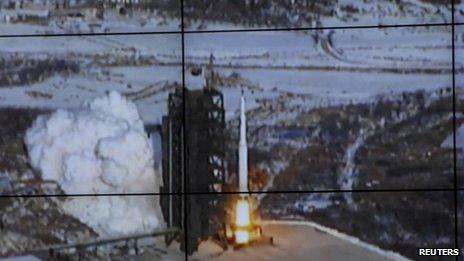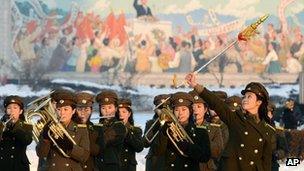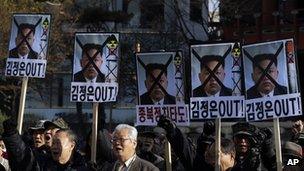North Korea thumbs nose at enemies
- Published

The rocket's successful launch was unexpected after a previous failed bid in April
By most measures, North Korea is a failed state - though long-standing hopes or fears of its collapse have so far proved wide of the mark.
Amid a delicate third-generation succession, and with most of its people underfed, this fierce little dinosaur of a regime could do with some good news. And now, at a stroke, they have it.
The same risk-taking which makes them winners at international circus contests - quadruple somersault on the high trapeze, anyone? - was evident in today's successful satellite launch.
So much could have gone wrong. An earlier attempt in April - which unusually foreign media were invited to inspect in advance at the same Sohae launch site used today - embarrassingly failed when the Unha-3 rocket exploded 90 seconds after lift-off.
The "reptile press", as Pyongyang likes to call us, were mostly derisive, about this and North Korea generally. Some even doubted whether the satellite was for real, or a cover for a long-range missile test. The rocket is the same, so in effect, this doubles as a missile test anyway.
Remarkable success

North Koreans celebrated the rocket's success on the streets
Such suspicions were not unfounded. Twice before, in 1998, then after a long gap in 2009, North Korea has claimed to successfully launch Kwangmyongsong satellites, which it said are orbiting the earth emitting "Song of General Kim Il-sung" and similar ditties.
But no-one has ever been able to detect those satellites. This time, however, South Korea and the North American Aerospace Defense Command (Norad) both confirmed that an object apparently achieved orbit. Whether the satellite is functioning is unknown at the time of writing.
This is a remarkable success. Experts thought it would take North Korea at least a year to assess April's failure and try again. And midwinter, with snow on the ground, is hardly the best season to do so. All previous launches have been in spring or summer.
North Korea likes to not only defy the world but also wrong-foot it, and here too they have scored. They had announced that the launch window would be extended to 29 December owing to technical problems.
Some satellite images seemed to show the rocket being dismantled, but this must have been a feint. So the world was taken by surprise today. That is a result.
North Korean media are ecstatic, and no wonder. This success ticks so many boxes for them, even though on closer inspection it may seem a rather short-sighted and Pyrrhic victory.
Better than South
At home, it marks almost a year since "dear leader" Kim Jong-il died last 17 December, and a year since his third son, the seemingly genial Kim Jong-un, was catapulted into power.
Many North Koreans may feel genuinely proud of their country's achievement and perhaps of their leaders. They would also like to eat better and be warm in the harsh Korean winter, so that glow of pride might not last long or run deep.
More important to the regime is to cock a snook at its several enemies. This rocket launch is especially well-timed to accomplish that on a whole range of fronts.
For a start this is one field, perhaps the only one, where North Korea can now boast of doing better than the hated South.
Seoul's own space rocket programme - with technical aid from Russia, interestingly - has been a damp squib so far. Two launches failed in 2009 and 2010. A third attempt due on 29 November was put off at the last minute until the New Year.
This also rains on another parade in Seoul. A week from today, South Koreans will elect their next president who takes office on 25 February for a five-year term.
Besides distracting attention from that, the irony is that politically, the rocket could backfire. Past experience suggests that North Korean provocations usually boost the conservative vote in South Korea. That is not the outcome Pyongyang professes to want.
Negotiations harder
The rocket is also a poke in the eye for Japan, which had threatened to shoot it down but in the event wisely held its fire.
Japan too has an imminent election on 16 December, which looks set to bring the nationalist conservative former Prime Minister Shinto Abe back to power.

The North's rocket launch was met with protests in the South
Again, hardly a good result for Pyongyang, which this year has resumed long-stalled talks towards diplomatic relations with Tokyo - a prospect now more distant than ever.
Then there is US President Barack Obama's policy of "strategic patience" with North Korea, which in practice had meant doing nothing much.
Presumably, Kim Jong-un hopes to shake up such complacency. But just as April's rocket launch aborted a tentative deal with the US, where North Korea would abstain from nuclear and missile tests in exchange for food aid, so this latest "success" will make resuming negotiations harder, not easier.
Last but by no means least, this rocket taxes China's patience. A nuclear test would have been a step too far, but Pyongyang has calculated carefully.
A missile, by contrast, produces exasperation in Beijing, as elsewhere, but no more.
China's strategic decision to grit its teeth and support this errant neighbour will continue under its new leader Xi Jinping, who in the past has sounded particularly supportive of the Sino-DPRK alliance.
All in all, with this rocket, Kim Jong-un has reminded the world that North Korea remains a force to be reckoned with.
But all the old questions remain, plus one new one. What mix of stick and carrot, if any, can stop Pyongyang from fireworks like this? And is a new young leader ready to consider more fruitful forms of engagement in the world?
The rocket, and North Korea's glee at its success, suggest depressingly that the third Kim is a chip off the old block, and that he has no new playbook in mind.